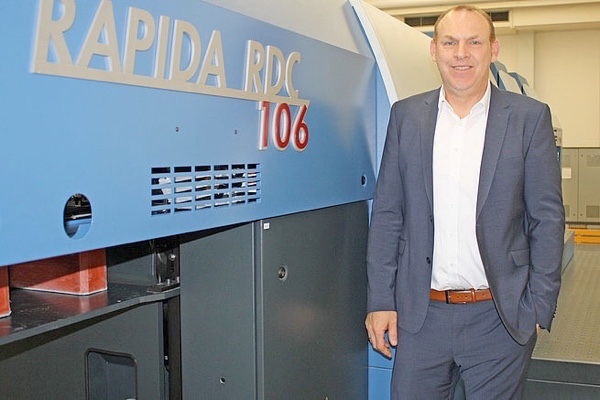Offset Printing
Edelmann Group delighted with the Rapida RDC 106

Friday 06. December 2019 - Edelmann Group in Heidenheim has been operating a Rapida RDC 106 rotary die-cutter for the past two years. The company is known for its commitment to innovative processes and technologies and was proud to serve as a pilot user of the die-cutter in packaging production, accompanying developments from the first tentative steps, through intensive field testing to final series maturity. In the meantime, the new machine is being used in daily production.
The Rapida RDC 106 is configured with three process units and handles folding cartons destined for international brands in the health care, beauty and consumer goods sectors. In most cases, the products are cut, embossed and stripped in an inline process.
The specialists at Edelmann are delighted with the high production performance of the rotary die-cutter. It runs at speeds up to 15,000 sheets per hour, and also impresses with very fast makeready. “That makes the Rapida RDC 106 so interesting for us,” says technical director Oliver Sattel. “Our competitiveness is based on a combination of quality and speed. For that reason, it is important for us to be involved in the development of new machines from the very beginning – and the Rapida RDC 106 is a perfect example for successful participation in the development process from the drawing board through to series maturity. We view this as genuine partnership – and we have maintained such a relationship with Koenig & Bauer for many years.”
Rotary process has many benefits
Alongside the sheer speed, the high-quality cutting and creasing results achieved with standardised tools are an important strength of the Rapida RDC 106. The excellent embossing results at a previously unknown production speed are a further bonus. The facility to assign individual processes to separate towers permits a significantly wider range of product options compared to traditional die-cutting systems. Flexibility regarding the length of cutting and creasing lines is one example.
Before the Rapida RDC 106 could be fully integrated into production, it was necessary to adapt a few aspects of the companys workflows for a rotary process, for example tool procurement and sheet layouts. The employees, too, had to rethink the approach to die-cutting jobs. Once everything was sorted, the quality of the products was spot on. Rotary die-cutting is fundamentally different from a flat-bed process. Only the final result – a folding carton – is identical.
Working together with Koenig & Bauer, Edelmann has now reached a level which meets the companys expectations to the full. And that provides a sound basis for future business. Oliver Sattel explains: “We are proud to have been part of this development process. Cutting-edge technology and employees who know exactly what they are doing: Those are our guarantees for an efficient production process leading not only to high-quality products, but also – and above all – to satisfied customers.”
